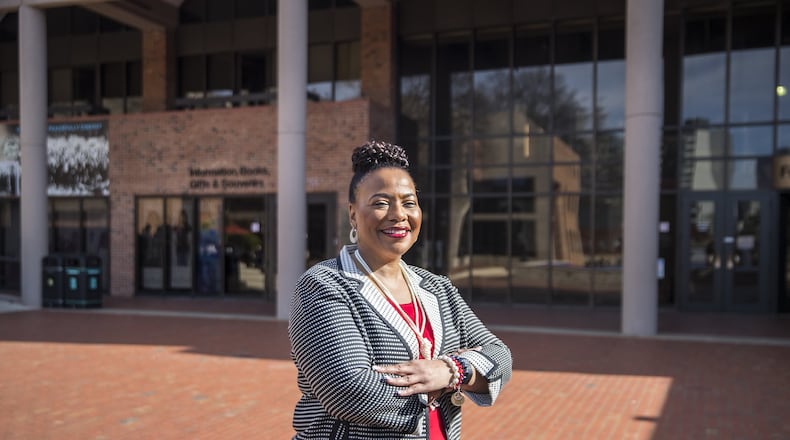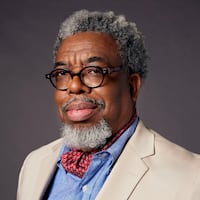Bernice King wasn’t introduced via Twitter and didn’t grace magazine covers with her doting parents.
The children of the famous were made differently a generation ago.
The first time the world saw her was on April 9, 1968, five days after her father was murdered.
Her debut photograph published around the world showed the distant eyes of a 5-year-old flopped lifelessly across the lap of her grieving mother, Coretta Scott King, who wore a black dress and mourning veil at Martin Luther King Jr.s’ funeral. It made photographer Moneta Sleet Jr. the first black Pulitzer Prize winner for photography.
“She was young. Five years old. But she was old enough to know and understand what was going on,” said King’s cousin, Isaac Newton Farris Jr., who at the time was also five. “And old enough to understand that she would no longer have a father.”
Six years later, in the same church where the photo was taken, her grandmother, Alberta Williams King, was gunned down while playing the organ for a Sunday service.
Fifty-two years on, as the world celebrates what would have been Martin Luther King Jr.’s 91st birthday, Bernice King is still dealing with, still fighting with the trauma. While all families deal with loss, death and grief, King has had to do it publicly — at times while comforting others.
King, the CEO of Atlanta’s King Center, often preaches about the “beloved community” — her father’s two-word description of a world where love and trust would triumph over fear and hatred. But she admitted in an exclusive interview with The Atlanta Journal-Constitution that she struggles with getting there herself as she deals with the issues left behind by her losses — grief, anger and what she calls her “violent tongue.”
“I have been on a journey to look at my issues of anger, and maybe even resentment, in my life,” King said. “Because when you don’t address things, other people become victims. There are still layers of anger that are inside of me that I am working on. But I told myself, ‘you’ve gotta manage this.’ I should not be taking my feelings out on other people.”
A woman in full
Bernice King carries herself like a woman in charge.
Last week, at the King Center to announce the non-profit’s plans for King Week, she seemed at ease leading a tour. She dressed impeccably in a black pair of slacks, red blouse, matching black and white jacket and pearls. Her hair and makeup were flawless.
Demonstrating an interactive exhibit designed to record the steps of children to teach them how much energy is needed to power things, she playfully yelled, “Why aren’t my steps being recorded?”
The engineer told her she was walking too slow.
She laughed.
Later, she brushed off the idea of running for political office after a reporter suggested it to her.
“Nope. Politics is a dirty game. I am not into all of that. Mudslinging? Nah,” King said.
She paused to re-think her answer.
“Mudslinging? I can do it. I am from Vine City,” she said, showing a bit of street bravado. “But no, I’ve gotten to a place now where I want a higher calling. I’m called to bridge the divide.”
Born in 1963, the year of the March on Washington, Bernice King is the youngest of Coretta and Martin Luther King Jr.’s four children.
A graduate of Spelman College and holding divinity and law degrees from Emory University, she spent much of her life in the shadows – first of her mother, who was an international symbol of grace — then of her older sister, Yolanda, who toured the country as a speaker and actress.
From the 1990s to the early 2000s, her brothers Martin Luther King III and Dexter Scott King commanded headlines as the dashing sons who either ran the King Center or the King estate, which raked in millions of dollars through leasing intellectual properties.
Bernice King’s moment arrived in 2005 when she took a more public role after her mother suffered a stroke. When Coretta Scott King died in 2006 of cancer, instead of the distant-eyed five-year-old, she stood in the pulpit and delivered an emotional eulogy.
In 2009, following in the footsteps of her father, she was elected president of the Southern Christian Leadership Conference but declined the position because of organizational infighting. A year later, she assumed control of the King Center, which her mother established weeks after the death of her father.
Following the 2007 death of Yolanda King, the remaining siblings often fought each other publicly and in court over the direction of the King legacy.
But as King III and Dexter King retreated from the spotlight in recent years, Bernice King emerged as the face and voice of the King family.
Unique pain
Exactly, a week before her father was assassinated on April 4, 1968, Bernice King turned 5.
“The first 3½ years of my life, the relationship between the two of us was distant,” Bernice King told the Atlanta Journal-Constitution in 2008. “He was away from home so much. Going into my fourth year, I began to warm up to him.”
King Jr. was out of town on her 5th birthday, leading what turned into a disastrous march through Memphis as protesters clashed with police, broke windows and looted stores.
King quickly returned to Atlanta, and the family celebrated Bernice’s birthday a day late on March 29. He stayed home a few days before going back to Memphis April 3. He returned in a coffin.
Credit: Copyright 2018 The Associated Press. All rights reserved. This material may not be published, broadcast, rewritten or redistributed. Copyright 2018 The Associated Press. All rights reserved. This material may not be published, broadcast, rewritten or redistributed. Copyright 2018 The Associated Press. All rights reserved. This material may not be published, broadcast, rewritten or redistributed. Copyright 2018 The Associated Press. All rights reserved. This material may not be published, broadcast, rewritten or redistributed. Copyright 2018 The Associated Press. All rights reserved. This material may not be published, broadcast, rewritten or redistributed.
Credit: Copyright 2018 The Associated Press. All rights reserved. This material may not be published, broadcast, rewritten or redistributed. Copyright 2018 The Associated Press. All rights reserved. This material may not be published, broadcast, rewritten or redistributed. Copyright 2018 The Associated Press. All rights reserved. This material may not be published, broadcast, rewritten or redistributed. Copyright 2018 The Associated Press. All rights reserved. This material may not be published, broadcast, rewritten or redistributed. Copyright 2018 The Associated Press. All rights reserved. This material may not be published, broadcast, rewritten or redistributed.
Farris said the pain that Bernice experienced was unique among her siblings. “Martin, Dexter and Yolanda had a sense of the man. It was a struggle for Bernice and she didn’t get the one-on-one attention that she could have used.”
Nekeshia Hammond is a psychologist who has written extensively about trauma and the impact that it has on adults who didn’t address childhood traumatic experiences. She specializes in supporting parents and teachers of children with mental health conditions.
“Parents have to ask because children are not going to tell you. There is a stigma about treatment and it’s hard for children to say, ‘I am depressed,’” Hammond said. “And for black children, it is either, ‘be strong,’ or ‘don’t talk about your feelings.’ And for her father being a public figure, she is constantly reliving it.”
King admitted last week that while she depended on her mother for emotional support, her mother never really knew the extent of what she was going through.
“My mother didn’t know,” King said. “I was a child who didn’t talk about it. As far as she was concerned, I was fine.”
Credit: W.A. Bridges Jr. / AJC
Credit: W.A. Bridges Jr. / AJC
King spent her first semester in college at Iowa’s Grinnell College. Among the mostly white student body, she was lonely, cried daily, battled depression and had to suppress “thoughts of suicide.”
It wasn’t until she reached her early 20s that she realized she had a problem with rage that was “right there under the surface.”
“I would just lash out at people,” she said. “There were times when I would even curse, like use curse words, at adults.”
King wouldn’t give examples but said it continued throughout her adulthood and into her role as the CEO of the King Center, where she said her ego often gets in the way of her progress.
“Many times I have to dial back and say to myself, ‘I didn’t say that quite right,’” King said. “It doesn’t feel good at the end of the day. I have gone home many days feeling really bad. I could have been humble enough to say, ‘let me re-do that with you.’”
Out from his shadow
Of her father’s children, she was the only one to follow him into the pulpit, keeping in place a family tradition that stretched from her paternal great-grandfather A.D. Williams, who took over Ebenezer Baptist Church in 1893, through her grandfather, “Daddy” King, to her father and his brother, Alfred (A.D.) King.
All of the kids in Farris’ generation were discouraged from “choosing” the ministry as a vocation, he said. Instead, the ministry had to “choose” them.
Bernice King was the only one chosen.
“That is how you know it is real. Her spiritual walk was legit, that is why you see the woman you see today,” Farris said. “That calling is one of those things that helped Bernice to deal with the anger and hurt she felt around her father’s assassination. Faith, as she became older, gave Bernice something to fall back on.”
Alveda King, another cousin, said at the end of 2019 members of the extended King family gathered for what she called a “transparent conversation.”
“We were able to discuss emotions and our own personal healing,” Alveda King said. “All of us are pretty open and honest about our feelings, and all of us are in different places.”
Her father — A.D. King — died in 1969. His death was ruled an accidental drowning, but his family contends that he too was murdered.
“As children, when you lose your parents like that, it is a struggle,” said Alveda King, adding that following the death of her own father, three of her siblings died of heart attacks due to what she said was unresolved trauma.
Last Tuesday, the day before what would have been her father's 91st birthday, Bernice King tweeted out a photo of him hoisting her up into the air in the backyard of their Vine City home.
“People often ask me, ‘What would he say were he alive today?” she tweeted. “He’s said it. We’re just not listening. He beckoned us far above civility. Love. Justice. True Peace. Mercy. Beloved Community.”
About the Author
Keep Reading
The Latest
Featured











